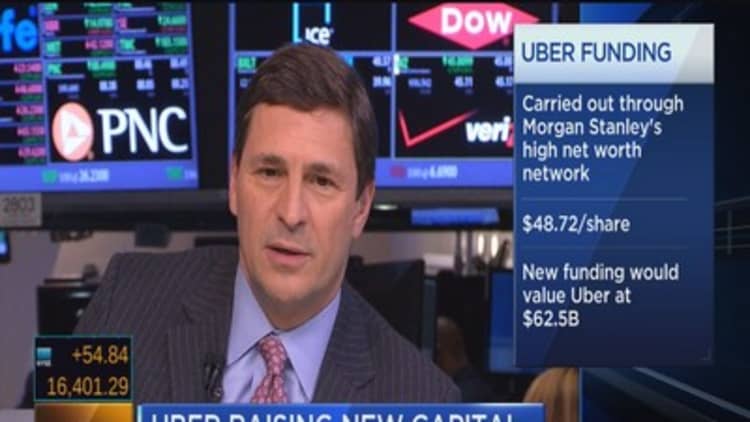
Hoping to fend off a post-holiday slump, Uber is cutting prices in 100 cities around the country and in Canada.
The San Francisco-based ride-hailing start-up announced the move in a blog post Friday, making this the third-straight year Uber has slashed fares to stave off the holiday blues. Uber did not specify which cities would feature the lower fares.
The price cuts come as the Uber is managing a growing fleet of drivers, increased competition and high hopes from a growing circle of investors. Sources on Monday told CNBC that Uber is seeking new capital from Morgan Stanley's network of high-net worth clients. Retail investors could pledge a $250,000 minimum to the company. Sources said Morgan Stanley investors would join funders previously leaked to outlets like The New York Times in December, which reported that privately owned Uber's valuation was $62.5 billion.
Read MoreUber taps Morgan Stanley clients in latest rounds
Meanwhile, competition from peers including Lyft is only increasing in a transportation industry that collectively is transforming quickly.
Last week, General Motors and Lyft said they are forming a partnership that could help them beat their rivals to the self-driving future. Lyft said that GM invested $500 million in the company as part of a $1 billion round of fundraising.
Driver impact
Uber in its blog post also addressed potential concerns about how the price cuts might impact drivers' ability to earn income. "Higher demand [due to price cuts] means more time moving people, less time spent waiting around and more money for drivers," according to the post.
"And if drivers aren't busier, prices will go back up again. In addition, we are guaranteeing earnings for drivers to ensure that no one is disadvantaged," Uber said in the post.
At least one analyst said Uber's price change is partly driven by more competition, and the rapidly changing transportation landscape.
"Uber's price cuts happen right after Lyft's strategic partnership announcement with GM and raising $500 million," said Jeremiah Owyang, founder of Silicon Valley-based Crowd Companies, which analyzes the sharing economy. "This encourages more adoption of rides in key markets," Owyang said in an email to CNBC. He's attending the Detroit Auto Show, where self-driving cars and other trends transforming the industry are on display.
Read MoreLured by income and flexibility, retirees becoming Uber drivers
Class action suit
Uber also faces a key legal hurdle. While many drivers have been lured by the independence of becoming their own bosses, Uber has triggered class-action litigation and conversations about the benefits and minuses of working in the so-called sharing economy.
Sometimes referred to as the gig economy, freelance workers are connected to often short-time, small tasks and projects. While such work comes with incredible flexibility, there are no work safety nets often associated with full-time work status, including health insurance.
In September, a federal judge in San Francisco granted Uber drivers class-action status in a lawsuit that claims the ride-hailing service treats drivers like employees without offering benefits, and avoiding costs associated with payroll taxes. The ruling sets the stage for a legal showdown that could have wide-ranging effects for Uber's business model — and the broader sharing economy.
"By increasing the number of rider demand by lowering price, this could activate more drivers, and reduce the pick-up time of rides, further bolstering the Uber brand," Owyang said.


